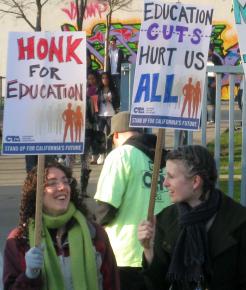Oakland teachers set for one-day strike
, a member of the Oakland Education Association, explains how an unprecedented attack by the school board has led her union to call a one-day strike.
OAKLAND TEACHERS are preparing to set up picket lines at all Oakland schools on April 29 for a one-day strike.
The action comes after two years of negotiation with the district. After talks broke down in the summer of 2009, the union and the district began mediation. Several sessions with a state-appointed mediator from last August to December didn't yield sufficient results, so the parties moved into the "fact finding" phase overseen by the California Public Employment Relations Board, which oversees labor-management relations in the public sector.
One representative from the union and one from the school district worked with the fact finder to review all proposals, and ultimately generate a report with recommendations on his findings. We received the report on April 13, and many in the union found it lacking.
As a special education teacher, I was particularly alarmed at the fact finder's proposal on special ed class sizes. At this point we do not have any class-size maximums. The proposal would have included maximums, but at a 20 percent increase on a calculated "average" special ed class size. We want limits--but limits that guarantee small classes, not intentionally expand them.

There was some movement in our direction on salary. However, the main proposal was that teachers would receive a 2 percent raise--in 2012.
While some teachers, including myself, felt that the fact finder's report was generally in the district's favor, we assumed that it would be the starting point to resume negotiations. So it was a surprise when the district refused to accept the report, and called off negotiations on April 16.
Even worse, on April 21 the school board to voted actually impose their "last, best and final" offer. Such an imposition is all but unprecedented, and as California Teachers Association staffer Ward Rountree said, it's a declaration of war.
At the meeting, Oakland Education Association (OEA) President Betty Olson-Jones pointed out to the Oakland School Board that they have done us a favor and demonstrated exactly why the OEA needs to keep organizing.
The imposition was not an idle threat. It was effective immediately, and we're now working under the terms of a contract we rejected months ago. Some highlights: There are no raises, class-size reduction is eliminated, and the adult education program is threatened with being wiped out.
These attacks, combined with budget cuts at every site in the district means that resources will be fewer, classes will be larger, and the quality of education as a whole will be degraded.
I WAS left with questions after the imposition. Why did the district take such an extreme position? The fact finder's report was in their favor, and returning to the table seemed like the obvious thing to do. Are they explicitly trying to break the union? If they are, it backfired. In my opinion, people are really angry, and more committed to the strike and continuing the struggle.
After talking to some other OEA members, I came to a different conclusion. They haven't broken the union, but they have created a lower floor from which to negotiate. Maybe this was their intention when they moved to impose.
As the lowest-paid union teachers in Alameda County, it is already difficult to recruit and retain teachers in Oakland. Worsening teaching conditions will only exacerbate this problem.
So why are we striking? We have protested, picketed, written letters and e-mails, and made phone calls. We have packed school board meetings, and held community meetings with parents. We have argued persistently and eloquently that there is money to settle the contract: that the district must shift its priorities from highly paid private consultants to teacher salaries.
There is money for standardized testing. There is money for more administrators than state law allows. There is money for a 6 percent raise for Superintendent Tony Smith, making his yearly salary nearly $300,000.
In spite of all of this, the district has foregone any negotiated solution and imposed their will onto the union. We have no choice at this point but to strike.
OUR STRIKE comes at a time when the state of California's budget is in crisis, and education is being slashed at every possible level. Thousands of educators, students, parents and community members came together on March 4 to protest these cuts, and launch a statewide movement against budget cuts.
I view our struggle in Oakland as part of this movement. We are not struggling in isolation. Teachers in Capistrano, in Orange County, began striking April 22 against pay cuts and furloughs. Students across the state continue to protest and organize.
I have been thinking about democracy a lot lately. Why is it legal for a school board of seven, in conjunction with the Superintendent Tony Smith, state trustee Vince Matthews, and most likely State Superintendent of Schools Jack O'Connell--all of 10 people--to make a unilateral decision that impacts 2,800 union members, and 37,000 students and their families?
The union has negotiated in good faith, and tirelessly, only to be told that we are irrelevant, that we get the contract we have so opposed. This is not democracy. Labor law that allows imposition needs to be changed, but more importantly unions and communities need to stand up and force democracy from below.
I am reminded of the late Howard Zinn's famous comment, "What matters is not who's sitting in the White House, but who's sitting in." (And with friends in Washington like Education Secretary Arne Duncan, who needs enemies?)
What the school district has done is unfair; what the state of California has done is unfair. But what matters now is what we do. Strike, occupy, protest. Struggle in whatever way fits in order to reclaim our right to a free public education for all.


